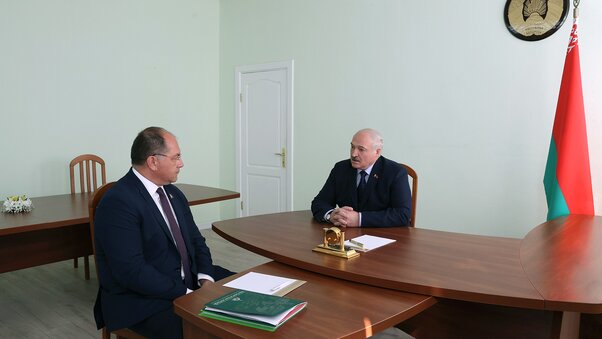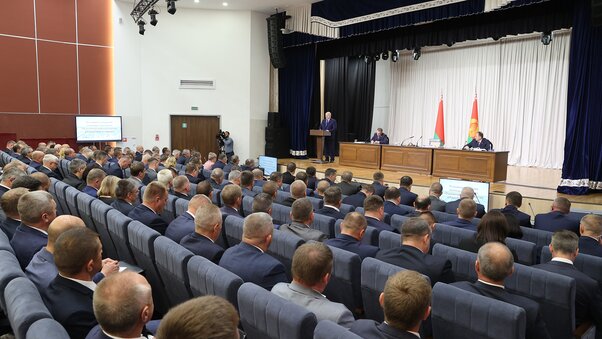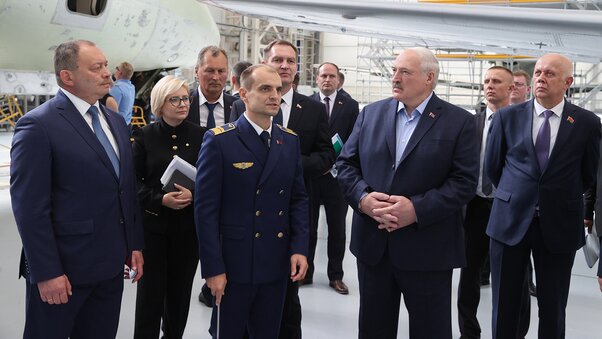Working trip to Minsk District
- 11
- 2
Belarusian President Aleksandr Lukashenko paid a working visit to Minsk District on 27 October.
During his working trip the head of state got familiar with the individual housing construction approaches using the industrial method and emphasized that everything should be done without red tape and unnecessary costs.
Aleksandr Lukashenko came to Novaya Okolitsa, a low-rise residential neighborhood under construction. “The topic of our today's event is housing construction without red tape,” the president said beginning his working trip. “People have complaints that it takes us long to complete construction projects. It is not even about the period of construction, but about the documents and various permits that need to be obtained to launch the project. Some people have complaints about the Emergencies Ministry, some - about the police, and so on.”
According to the head of state, the first step has been taken earlier - private developers were allowed to build housing the way they wanted. This is how people used to build one-storey houses in rural area and “did not ask anyone how to build”.
“That is why the decision was made: if you want to build, you are welcome to build. You do not have to obtain any permissions at all. The only requirement is that the house should look more or less fit in with the village surroundings. If you want to consult with the police, the Emergencies Ministry, architects – you are welcome to do so. It is your choice. But you are responsible for what you build,” Aleksandr Lukashenko said. “Nothing has collapsed yet. People continue building houses. However there are still some talks, complaints. They are right to some extent. Probably, we still have not done something.”
At the beginning of the year Deputy Prime Minister Anatoly Sivak was tasked to implement a 50-hectare construction project in Novaya Okolitsa. “I told him to do the way he believes right. I only asked him to use concrete, not asphalt [for road construction], as it will last forever. There is no need for any excesses here. The village should be built here in a smart way. The way people need it. Without unnecessary expenses,” the president said.
The head of state paid special attention to the landscaping of the grounds surrounding the houses, along roads and interchanges. The president gave instructions to practise economy in everything. As for the area near the houses, it is up to the residents to keep it as they like.
“You have to approach everything wisely. Such an approach means we can save millions of rubles. That is why the goal and the task for the deputy prime minister (he makes decisions) to make everything in an economical manner,” Aleksandr Lukashenko said.
The head of state praised the houses he saw. “It is perfect,” the head of state said.
According to Deputy Prime Minister Anatoly Sivak, a person who has a house of their own and a land plot has an absolutely different standard of living.
“You are right, it is an absolutely different person. I keep telling Belarusians that all land plots in Belarus, any pieces of land here are a gift. I encourage them to buy a piece of land in distant, unpromising, abandoned villages. This is a gift for people. Such pieces of land are almost free now. Russians have heard the news and are paying big money for this today. Our people do not hurry much to buy a land plot,” Aleksandr Lukashenko said.
State-owned enterprises are almost non-present in the market of individual housing construction. The Novaya Okolitsa neighborhood project is an attempt to rectify the situation and make housing construction cheaper for people.
“This settlement is the first stage. 12 of our organizations are building houses here. We are also testing certain technical solutions here,” Anatoly Sivak said.
For example, the project will envisage one-way traffic inside the development, while cargo and technical transport will move along the perimeter of the area. The houses already have water and sewerage systems, electric heating. The cost starts from Br2,400 per square meter. “This is a complete, ‘ready to move in' house,” the deputy prime minister said.
“The instruction was to make different designs of houses for people to choose from,” the president said.
During the implementation of the construction project, a number of bureaucratic bottlenecks, which increased the final cost of the house, were revealed. The head of state was offered to amend the existing regulations to remove these shortcomings. The president supported the proposal.
The government also suggested taking stimulating measures, including the expansion of preferential lending to get people interested in buying a house in rural areas.
“Submit them so that we could adopt these regulations and start working in the near future,” Aleksandr Lukashenko said.
Belarus is currently developing the housing construction concept for the next five years. Anatoly Sivak believes that the existing infrastructure needs to be used more widely. “Today we still have houses that need major repairs. They are almost in an out-of-repair condition. We may demolish a five-storey old building, leave the foundation, and put a new house on it,” he said.
“Make suggestions. Consider them already accepted. This is an economical approach I am talking about,” the head of state said.
The president spoke about the construction of a new residential area near the village of Okolitsa at a government meeting in June 2023. “We have decided to build a village near Okolitsa. The corresponding instruction was given to Deputy Prime Minister Anatoly Sivak. We will build it as he is offered to or decides himself,” Aleksandr Lukashenko emphasized. “We need to build a beautiful village quickly and efficiently. People will be happy to live there and buy these plots.”
The general layout of the Novaya Okolitsa residential area (a total of 210 hectares) near the village of Okolitsa is under development. The first stage of the project envisages the construction of 228 single-family houses with necessary engineering and transportation infrastructure on the area of 46.16 hectares.


